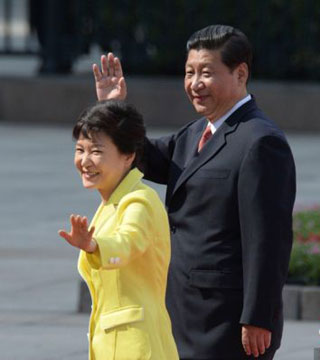|
 |
| South Korean President Park Geun-Hye (L) and Chinese President Xi Jinping wave as they inspect Chinese honour guards during a welcoming ceremony outside the Great Hall of the People on June 27, 2013 in Beijing, China. |
On Wednesday the President of the Republic of Korea Park Geun-hye asked Chinese President Xi Jinping to persuade the Democratic People’s Republic of Korea not to conduct a fourth nuclear test when US President Barack Obama visits the ROK.
Concern has grown in the ROK that the DPRK “could spark an arms race and a nuclear domino effect that could change the security landscape in Northeast Asia”.
China and the ROK have entered the era of the best-ever relationship, and the DPRK’s nuclear tests pose a threat not only to the ROK, but also China’s border security.
The United States has been urging China to press the DPRK on one hand while encouraging Japan to provoke China on the other.
In written remarks published by Japan’s Yomiuri Shimbun, Obama said “The policy of the United States is clear — the Senkaku Islands are administered by Japan and therefore fall within the scope of Article 5 of the US-Japan Treaty of Mutual Cooperation and Security. And we oppose any unilateral attempts to undermine Japan’s administration of these islands.”
But Uncle Sam is really a business man who wants to gain without pain. The US is pouring fuel on the flames, so the DPRK will be angered and pushed into conducting a fourth nuclear test, which will undermine China’s security and drive a wedge between China and the DPRK. Moreover, the US can fully make use of the DPRK’s nuclear threat to strengthen US-Japan-ROK trilateral cooperation, and eventually form a “mini NATO” in Asia to contain China and Russia.
In fact, the ball is in the US’ court. If it truly wants to resolve the DPRK nuclear issue, it has to abandon the schemes to contain Russia and China with the DPRK nuclear card.
In his effort to build the momentum for Obama’s visit to Asia, US Assistant Secretary of State for East Asia Danny Russel came up with some impractical suggestions. For instance, addressing a conference organized by Asia Society on April 1, he said China could help reduce US military deployments in East Asia by using its “influence” over the DPRK to guide it to the right path. By saying the US would reduce troops in East Asia if China made the DPRK abandon its nuclear program, Russel has wrongly assumed that Beijing has the power to control Pyongyang. Besides, his statement implies that if China doesn’t do so, the US will continue consolidating its forces in East Asia in order to protect its Asian allies, especially the ROK and Japan.
Perhaps Russel does not know that the military might cannot resolve the Korean Peninsula nuclear issue and the best way of resolving it is for the US to withdraw troops from the ROK and sign a peace agreement with the DPRK.
China’s efforts to resolve the DPRK nuclear issue and ease tensions on the Peninsula have yielded results, and the international community acknowledges that. But some countries with ulterior motives say that China has not exerted enough pressure on the DPRK to make it abandon its nuclear program. They also say that China’s trade with and humanitarian aid to the DPRK have seriously undermined the impact of the UN sanctions on the country and helped it to develop nuclear weapons.